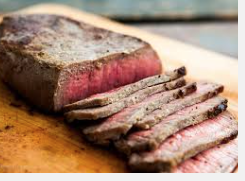TRADITIONAL MEAT
How did our family traditions become centered around eating traditional meat? Think about it. When we think of Thanksgiving, we think of turkey. If we eat pork, then New Year’s celebrations often revolve around pork and sauerkraut. At Christian Easter, the traditional meal is ham. And in the summer, we wait for that first hamburger or steak on the grill. How did that happen to a species that was designed to eat vegetables and fruits, nuts, berries and legumes? We can imagine that eating meat was initially an opportunistic event, born of the need to survive.
The taste of cooked meat, plus the sustained energy that came from eating high-fat meat products made primitive sense even to earliest man. Initially, finding cooked animal meat, from a forest fire, would have been cause for celebration. It’s something everyone in a clan would have participated in eating together. When man learned to hunt and moved to a hunting orientation, rather than a hunter-gatherer orientation, he would have done this in groups. They would have had to hunt in teams, and killing an animal for food would have been a group effort. Hunting and killing an animal meant food not just for the individual, but for the clan, and would have been cause for celebration when the hunters brought the food home. If they brought the animal back to the clan, it would have taken a group effort to skin the animal and tear or cut the meat from the carcass. Everyone would have participated in this, and subsequently, shared in the rewards of their work.
It’s easy to see how, once we didn’t have to hunt for meat, but could buy it, the need for gathering and celebration was deeply ingrained in our natures. We celebrate the seasons and life’s events with family and friends, and because those early celebrations involved eating traditional meat, that tradition has continued to modern times.

Share this Post